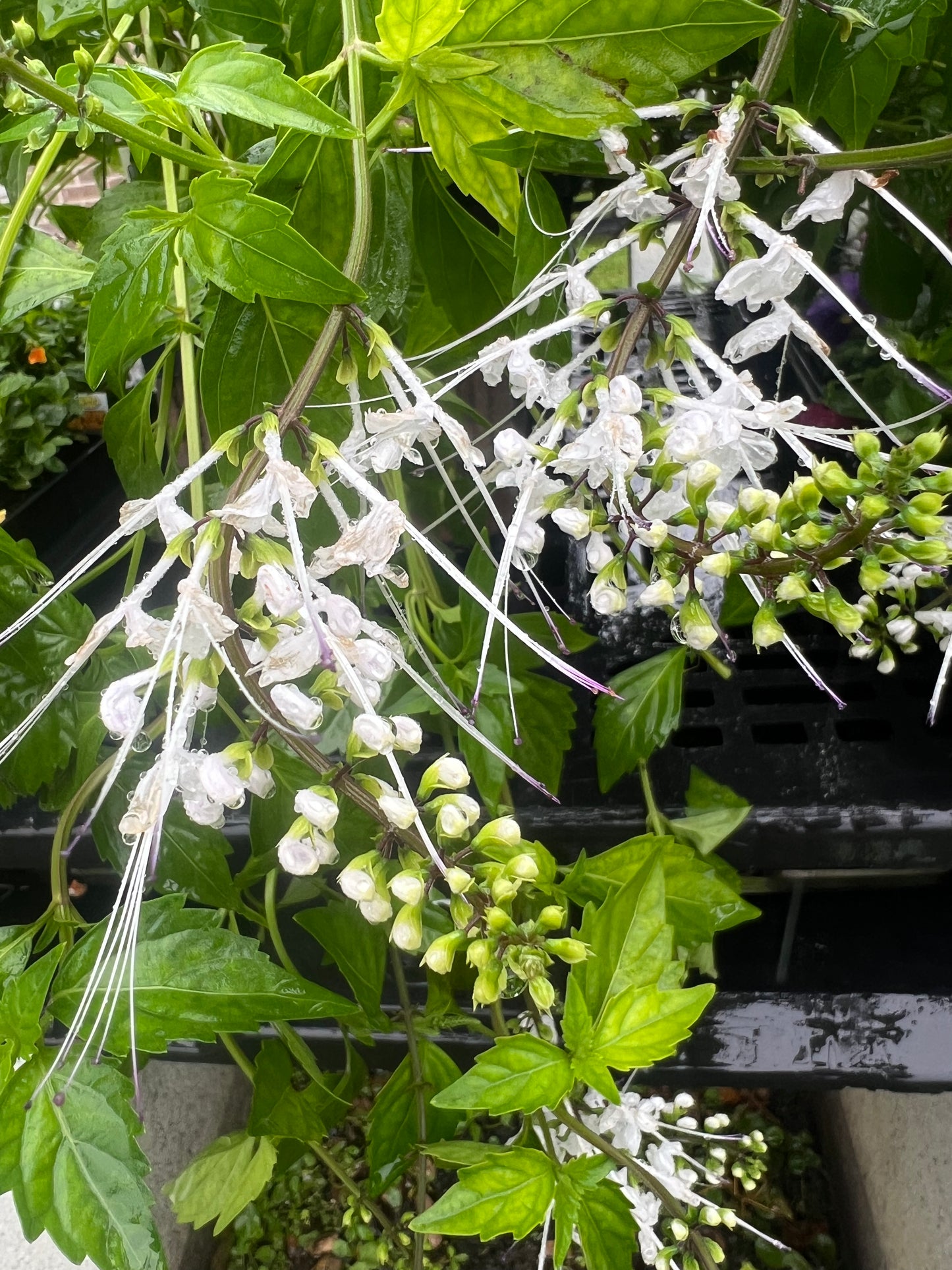Cat Whiskers Plant (Orthosiphon aristatus)
Cat Whiskers Plant (Orthosiphon aristatus)
Cat Whiskers Plant (Orthosiphon aristatus)
Plant Description:
Cat Whiskers is a tropical perennial known for its striking, long, white or purple flowers that resemble cat whiskers. These flowers emerge from upright, branched spikes, making the plant an eye-catching addition to any garden. The plant has dark green, serrated leaves and can add a unique texture to landscapes. It blooms from late spring to fall, attracting pollinators like bees, butterflies, and hummingbirds.
Native Range:
This plant is native to Southeast Asia but has become popular in tropical and subtropical gardens worldwide. In its native range, it's often found in humid, forested environments.
USDA Growing Zones:
Cat Whiskers thrives in USDA zones 9 to 11, where it can be grown as a perennial. In cooler regions, it can be treated as an annual or brought indoors during colder months.
Height and Width:
- Height: Typically reaches about 2 to 4 feet (60 to 120 cm).
- Width: Spreads 1.5 to 3 feet (45 to 90 cm).
Light Requirements:
Prefers full sun to partial shade. More flowers will bloom when the plant receives plenty of sunlight, though some afternoon shade in very hot climates can help prevent stress.
Soil Requirements:
It prefers well-draining, rich soil that retains moisture but doesn’t get waterlogged. Amend the soil with compost for best results. Slightly acidic to neutral soil is ideal.
Watering:
This plant enjoys consistent moisture but does not tolerate standing water. Regular watering is essential, especially during dry periods, to keep the soil evenly moist.
Temperature and Humidity:
As a tropical plant, Cat Whiskers enjoys warm temperatures and high humidity. It is sensitive to frost, so bring it indoors or protect it when temperatures drop below 50°F (10°C).
Uses:
- Ornamental: Often grown for its decorative flowers and foliage, making it great for borders, mixed flower beds, and container gardening.
- Medicinal: In Southeast Asia, the plant is used in traditional medicine for treating kidney ailments and as a diuretic.
- Pollinator-Friendly: The nectar-rich flowers are attractive to bees, butterflies, and hummingbirds, making it a valuable addition to wildlife gardens.
Maintenance:
Prune back in late winter or early spring to encourage fuller growth and more flowers. It can become leggy, so regular pinching or light pruning helps keep its shape.
---SHIPPING NOTICE PLEASE READ BEFORE PURCHASING LIVE PLANTS!---
We WILL NOT refund the purchase of or the shipping cost of live plants purchased with the intent to be shipped to states that do not authorize importing live plants or to states with restrictions! Purchases to these states will be held for 30 days for pick-up at our Slidell, Louisiana store and the shipping cost associated with these purchases will be held for the care of the plant while waiting to be picked up. All sales are final. If the plant(s) purchased are not picked up within 30 days from the date of order, these items will be returned to our sales inventory and you WILL NOT be refunded. Thank you for understanding these policies.
Due to regulations, certain states have restrictions on importing plants. Please review the list below to ensure you're not attempting to order any restricted plants in your area.
**Important Note:** We do not ship any plants outside the U.S.
State-Specific Restrictions - We ARE NOT responsible for any plant(s) that are not listed in these restrictions. Purchaser bears all responsibility for making sure the plant(s) they desire to purchase are not banned from being imported to the shipping state:
Arizona: Juglans spp.
California: Castanea spp., Juglans spp., Pinus spp., Quercus spp.
Colorado: Some counties restrict Prunus spp. Please verify your local county regulations.
Florida: Castanea spp., Cornus spp., Quercus spp., Cornus mas
Georgia: Vaccinium spp.
Hawaii: Pinus spp.
Idaho: Humulus lupulus, Mentha spp., Vitis spp.
Indiana: Fragraria spp., Rosa spp.
Kansas: Juglans spp.
Michigan: Abies spp., Vaccinium spp.
Montana: Pinus spp.
Nevada: Allium spp.
Mentha spp.
New Jersey: Rosa spp.
New York: Vitis spp.
Oregon: Allium spp., Castanea spp., Corylus spp., Humulus lupulus, Quercus spp., Sambucus nigra, Ulmus spp., Vaccinium spp., Vitis spp.
Texas: Juglans spp.
Washington: Allium spp., Castanea spp., Corylus spp., Humulus lupulus, Vaccinium spp., Vitis spp.
Wisconsin: Abies spp., Pinus spp., Picea spp., Mentha spp.
Additionally, we cannot ship plants in soil medium to the following states: AK, AL, AR, AZ, CA, HI, ID, KS, MS, MT, ND, NM, NV, OK, OR, SD, TX, UT, WA.
Couldn't load pickup availability


